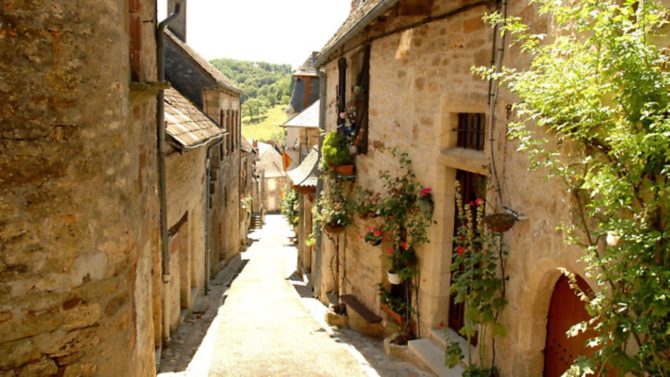7 things to consider before buying in a French village

Hankering for a readymade community in France? Don’t overlook these 7 important considerations before you buy village property in France
1. External access
Access, or lack of it, should be a major consideration. It may not matter to you that there isn’t a garage or that you can’t park outside your front door, but it’s useful to be able to stop and offload outside, be it for groceries or taking in a new sofa. If there’s a garage down a narrow street, check what size of car you can manoeuvre in and out before getting an SUV embarrassingly stuck. If you need to park nearby, is the parking free of charge and always available, or is there a problem on market days or during school terms? If you cycle, think about where you can keep your bikes securely.
2. Internal space
Within a property, measure the width of narrow hallways and staircases before you buy furniture or appliances. You may decide to use an upstairs room with a rooftop view as your living space, but don’t buy a sofa until you’ve checked you can get it up there. You might be able to hoist it though the window, but check out nearby overhead power cables before you do.
3. Daylight
Daylight can be a problem, and it can be hard on a first visit to check how much light the rooms and outside terraces receive throughout the day, and year round. Check where south is, and look for overshadowing from taller buildings or properties on higher ground, and moss on roof slopes. On a hot day a shady terrace may be appealing, but if your only sitting-out space is in the shade all year round it will be depressing on a sunny winter’s day, when you can see the sun all around you. Conversely, a sunny roof terrace can be too hot in July and August!
4. Planning permission
Obtaining permission for works near historic buildings (such as the village church) and in conservation areas can take time, and there are often restrictions on the use of materials or the creation of new openings such as roof windows. If making external alterations to a property is essential to you, do ensure you check out the situation with the mairie before you commit to your purchase.
Read more: The planning permission process in France
5. Property taxes
It’s worth getting the full facts on the taxe d’habitation and taxe foncière; don’t assume it won’t be much for a village property. Urban tax rates are higher than rural ones, and can come as a shock.
Read more: A guide to French taxes
6. Water and drainage
A village-centre property is normally on mains water and mains drainage (tout à l’égout) but it’s worth checking, especially if you are buying a bargain ruin to renovate. Insist on being shown the location of the water meter and where the foul drainage goes. Yes, the vendor and the agent may find this annoying but it’s your money and you are entitled to know what you are buying.
Some properties have never been connected to the drainage network at all, others only partially, despite the fact that the owners were required to do so back in the mists of time. It won’t be amusing to find out later that, while your kitchen sink drains into the mains system, your toilet waste actually empties into an old cellar under your feet.
Read more: A guide to septic tanks
7. Neighbours
It’s true that living cheek-by-jowl with your neighbours can result in friction, but the conviviality of village life, the feeling of belonging to a community and the security offered by neighbours in close proximity to you generally outweigh such issues. We and our neighbours keep an eye out when people go away, water each other’s plants and feed pets, mind the kids, help when someone breaks a leg or suffers a bereavement and check on the old folk. Someone will always have a spare gas bottle, the right screwdriver or an emergency bottle of Ricard for unexpected guests. Speaking French helps, but it’s not essential – neighbourliness overcomes most problems.
Written by Mary Hall, property manager
Read our other articles on:
5 things to consider before buying a rural retreat
Share to: Facebook Twitter LinkedIn Email


